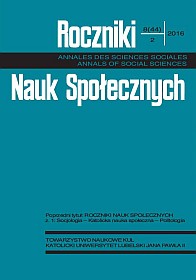Psychosocial Functioning of an Adult Child in a Migrant Family on the Basis of Psycho-Drawing Method. Comparative Research
Abstract
This article presents the findings from a comparative study on two groups of adults. The first comprised 48 persons, who had been separated from one or both of their parents in their childhood as a result of economic migration; and the second included 48 persons who had not experienced any long-term separation from their parents during their childhood. The study and control groups were selected on a complementary basis to account for such variables as age, gender, place of residence and education. In the study group, the length of separation from one or both parents (adult children of migrants) was 3 to 7 years.
The study used a structured interview developed by the Author for the purposes of this study, and a projective test, namely a psycho-drawing described as “My family of origin”, drawn from the present perspective. Subjects were asked to draw their families – parents and adult siblings as a family group, while also depicting current relations between the individual family members. On the basis of the literature on the subject, the Author developed a questionnaire to assess the drawing. The questionnaire, entitled “My family”, accounted for 6 categories of psycho-social functioning of the individual, including idealization or devaluation (of a child, father, or mother), compared to other persons; the quality of child’s emotionality expressed by their portrayal of themselves in the drawing; child’s anxiety level expressed through the projection in the drawing; aggression accumulated in the figure portrayed in the drawing (child, father, mother); and readiness to communicate with the parent who lives abroad/at home. The qualitative and quantitative assessment of the collected data made it possible do identify long-term consequences of such separation.
References
Braun-Gałkowska M.: Poznanie systemu rodzinnego, Lublin: Wydawnictwo KUL 2007.
Danilewicz W.: Rodzina ponad granicami. Transnarodowe doświadczenie wspólnoty, Białystok: Trans Humana 2010.
Danilewicz W.: Rodzina wśród ponowoczesnych dylematów, w: Oblicza współczesności w perspektywie pedagogiki społecznej, red. W. Danilewicz, Warszawa: Wydawnictwo Akademickie „Żak” 2009, s. 181-198.
Gizicka D., Gorbaniuk J., Szyszka M.: Rodzina w sytuacji rozłąki migracyjnej, Lublin: Wydawnictwo KUL 2010.
Hall C.S., Lindzey G.: Teorie osobowości, Warszawa: PWN 2001.
Kawczyńska-Butrym Z.: Rodzina w migracji zarobkowej, w: Sytuacja rodziny we współczesnym społeczeństwie – doświadczenia Europy Środkowo-Wschodniej, red. J. Gorbaniuk, Lublin: Wydawnictwo EL-Press 2007, s. 63-70.
Kozdrowicz E., Walczak B.: Postawy wychowawcze rodziców-migrantów w percepcji dzieci, „Pedagogika Społeczna” 2008, nr 3, s. 163-182.
Lachowska B., Braun-Gałkowska M.: Agresja u dzieci i jej ekspresja w rysunku rodziny, w: Rysunek projekcyjny jako metoda badań psychologicznych, red. M. Łaguna, B. Lachowska, Lublin: Towarzystwo Naukowe KUL 2003, s. 97-124.
Łaguna M., Gałkowska A.: Społeczne aspekty obrazu siebie w rysunku projekcyjnym „Ja-wśród ludzi”, w: Rysunek projekcyjny jako metoda badań psychologicznych, red. M. Łaguna, B. Lachowska, Lublin: Towarzystwo Naukowe KUL 2003, s. 124-150.
Maciarz A.: Sieroctwo duchowe dzieci, „Problemy Opiekuńczo-Wychowawcze” 1991, nr 6, s. 242-244.
Markowski K.: Economic Aspects of Migration, w: Migration – a Challenge to the 21st Century, red. M. Zięba, Lublin: Wydawnictwo EL-Press 2008.
Młyński J., Szewczyk W.: Migracje zarobkowe Polaków. Badania i refleksje, Tarnów: Biblios 2010.
Myers D.G.: Psychologia, Poznań: Zysk i S-ka 2003.
Oleszkowicz A., Senejko A.: Psychologia dorastania. Zmiany rozwojowe w dobie globalizacji, Warszawa: Wydawnictwo Naukowe PWN 2013.
Węgierski Z.: Dysfunkcjonalność i patologia rodzin a sieroctwo społeczne, w: Pedagogika opiekuńcza, przeszłość – teraźniejszość – przyszłość, red. E. Jundził, R. Pawłowska, Gdańsk: Harmonia 2008, s. 105-118.
Zorraquino J.C.: Depresja u dzieci i młodzieży, Kraków: ESPE 2002.
Copyright (c) 2016 Roczniki Nauk Społecznych

This work is licensed under a Creative Commons Attribution-NonCommercial-NoDerivatives 4.0 International License.


